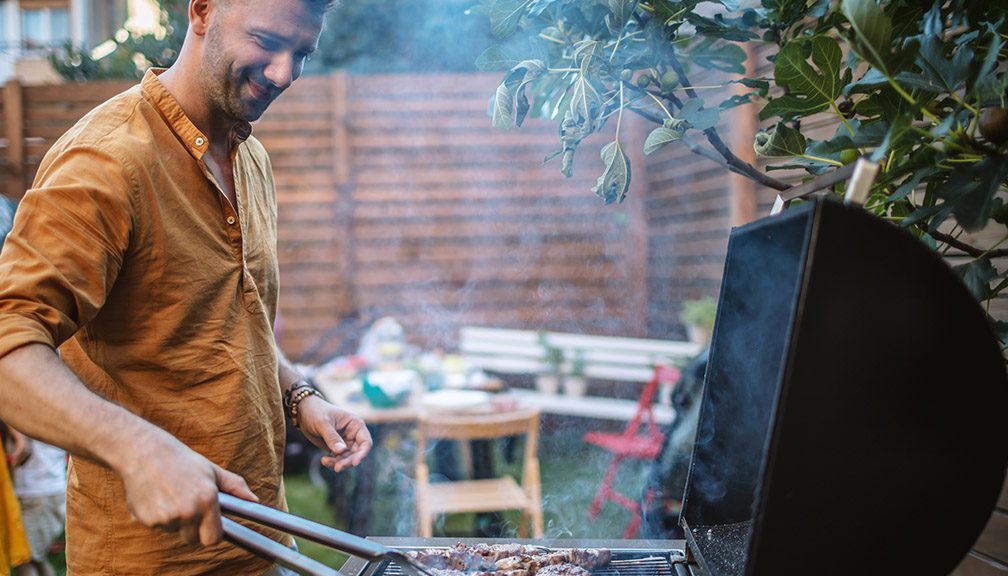15 grill safety tips.

According to the National Fire Protection Association, an average of 10,600 fires are started by grills each year. Whether you own a gas grill, charcoal grill, or smoker, putting safety first before you fire up to cook is imperative.
Add more fun and less risk to your next summer barbecue with these 15 grill safety tips:
Check the grill’s hose for gas leaks. Before using your grill for the first time of the season, make sure it’s ready to go. Apply a light soap and water solution to the hose, and then turn on the propane tank. If there’s a gas leak, the propane will release bubbles around the hose. If there are no bubbles, your grill is safe and ready to be ignited.
Keep the grill at least 10 feet from your home. Avoid areas close to your house, deck, garage, shed, etc. And don’t forget to move your grill out from under any eaves, power lines, or overhanging branches.
Don’t grill in the garage. If it’s raining on your plans, it can be tempting to bring the grill into the garage… but doing so could bring in serious consequences. Flames and carbon monoxide can build up indoors and lead to fire, toxic fumes, or even a gas explosion. Never grill in an enclosed area. It is never safe.
Turn on the grill only if the lid is open. If you turn on the grill while the lid is closed, propane can build up inside. When ignited, it could blow up and cause serious damage to you or the things around you.
Never leave the grill unattended. Once it’s lit, it needs constant supervision. Don’t go indoors or far enough away that you couldn’t spot or react to danger. While smokers take hours to cook and it’s not ideal to sit and wait, it is safe to sync it to your smartphone for monitoring, so long as you physically check the smoker often.
Create a “kid-free zone.” Encourage kids (and even pets) to stay at least three feet away from the grill. Think through your yard’s setup and high-traffic areas before placing your grill so it’s not in the way of fun.
Grill on a level surface. Place your grill on a flat, sturdy surface like a concrete pad to prevent tipping. Consider adding a grill-safe mat beneath it to protect your deck or patio.
Keep a fire extinguisher near the grill. Baking soda, a bucket of sand, or a garden hose can control a grease fire, but a fire extinguisher is always the safest, most assured option. Keep one nearby while grilling and know how to use it. For smaller flames from fat drips, keep a spray bottle with water on hand so you can quickly extinguish flames before they spread.
If you smell gas while you’re grilling, move away. Call the fire department immediately if you smell gas. Don’t risk continuing to grill and potentially putting yourself in danger.
Wear a heavy apron and oven mitts. Protect yourself from heat and flames with the proper grilling attire. Always wear shoes near the grill and opt for closed-toe sneakers over sandals. Consider wearing grilling gloves to protect your hands from flames. Never wear loosely fitted clothing while grilling.
Use long-handled utensils. Avoid burns and splatters with extra-long tools.
Clean your grill regularly. The more grease and fat that has built up on your grill, the more fuel there is for a fire. After it cools, clean your grill grates and empty the grease tray.
Don’t cover the grill until it’s cooled. Before walking away from the grill, double-check that everything is turned off and the gas canister is fully closed. Even after dinner time, the grill could still be hot. To avoid any unnecessary burns this summer, don’t move, store, or cover your grill until you’re sure it’s cooled.
Put coals and embers in a metal can, away from your home. Once the grill has cooled, get rid of your coals and embers the right way. Dispose of them in an empty metal can rather than in your trash can or yard. Improper disposal could lead to larger flames.
Store propane tanks outside and away from your house. Keep propane tanks outdoors in well-ventilated areas. Store them upright and always check to make sure the valves are turned off fully.
Now that you’re covered for cookouts with our 15 grill safety tips, ensure the rest of your home is equally covered with homeowners insurance. Talk to a local, independent agent about your current policy and where you could add protection.







